Love in Activism
Soma Chu, Grant Program Intern
The May 24 mass shooting in Uvalde, Texas elementary school has shaken up the country, sparking intense debates where both sides of the political spectrum rose up in anger and fear. Whether it is anxiety about sending one’s kids to school or the panic of many who believe their second amendment rights will be taken away, there is a common thread of fear that underlies the country and political landscape.
Regardless of people’s varying political opinions on the issue of gun violence, it is a fact that many children across the nation are increasingly scared to go to school.
In a Time article titled, “School Shootings are Raising Anxiety and Panic in U.S. Children,” Maya Chung discusses the growing mental health crises amongst young people, with mass shootings playing a large role in this issue. The constant exposure to gun violence through media outlets and ceaseless arguing on the political field has left many young people in this country with increasing levels of anxiety. Along with gun violence, climate change and COVID-19 add to the existential threats that young people face, leaving them fearful and hopeless about their future. In November of 2021, the American Academy of Pediatrics, American Academy of Child and Adolescent Psychiatry, and Children’s Hospital Association jointly declared a national emergency for the mental health of children who they say are dealing with unforeseen rates of “depression, anxiety, trauma, loneliness, and suicidality.”
This problem is not specific to the younger generation. In a New York Times article, Arthur C. Brooks identifies what he calls an “epidemic of loneliness” in America, which gets worse every successive generation. Quoting Senator Ben Sasse’s book, Them: Why We Hate Each Other – and How to Heal, Brooks writes that the pervasive feeling of loneliness has led to skyrocketing levels of suicide as well as worsening political polarization in this country. To fill the void of isolation that many Americans suffer from, they turn to the comfort of their political “team,” finding solidarity in their echo chamber and uniting against a common enemy.
As communities slowly deteriorate, the country is led down a deep path of fear, anger, and greater loneliness. Legislation for stricter background checks or red flag laws can bring safety and healing when it comes to gun violence in America. However, what can people do about communities disappearing? What can be done about the epidemic of loneliness that only worsens over time? What can be done about a nation that finds comfort in hate? No measure taken by the government can bring love to the heart of this nation.
To fill the void of isolation that many Americans suffer from, they turn to the comfort of their political “team,” finding solidarity in their echo chamber and uniting against a common enemy.
Author bell hooks and her work can be used as a guide in helping people understand how love should be used as the energy source behind community building and social justice activism. Born in 1952, hooks was an author and social activist who wrote on race, gender, and class. First published in 2000, All About Love is hooks’ bestselling novel about the necessity of love in justice. The deep divisions and loneliness in society, according to hooks, is a result of society’s failure and unwillingness to enact true love, which consists of care, compassion, responsibility, and unity.
In the book, she discusses the importance of “loving communion,” or love within a community. Everyone is born interconnected with the people around them and it is within human nature to serve one another, rather than degrade, dehumanize, and compete with one another. In a capitalist society, where individual success at the expense of others is exalted, it is radical and countercultural to build community through genuine love. hooks writes that genuine love is only possible when people guide their actions with courage rather than fear. Fear of vulnerability is the foundation of an insatiable desire for power. This desire builds walls, which leads to lovelessness. When society can embrace vulnerability, people can learn to sacrifice for and forgive others, extending a loving hand, and ultimately, letting go of fear.
Author bell hooks also pushes her audience to view love as a verb, rather than a noun, emphasizing love as a choice and something that requires consistent effort. In popular culture, love is often portrayed as something that exists simply through familial bonds or something people fall into because of fate. However, hooks argues that love never accidentally or unconsciously exists as it is something that must be maintained and watered regularly to stay alive. When a community is broken, it is within people’s obligation to actively mend the cracks and fight for a better world because without action, there is no love. Cynicism about change is the breeding ground for passivity and a loss of love. Love as a verb paired with radical hope is a necessary force in social justice movements that attempt to heal and rebuild communities.
Jocelyn D. Larkin presents Lance Slaughter with his induction into the Class Action Hall of Fame.
As a non-profit organization that works for the community, the Impact Fund always strives to be led by the principle of loving communion that hooks writes about in All About Love. The kind of compassion and grace that is required to prioritize the needs of the community over one’s own comforts is modeled by the plaintiffs the Impact Fund has the opportunity to work with. In recognizing the lead plaintiffs in our Class Action Hall of Fame, Impact Fund Executive Director, Jocelyn Larkin said, “Many ordinary people have put their lives and livelihoods on hold to champion the interests of communities: the poor, women, people with disabilities, and all those marginalized as ‘other’ by the privileged and the powerful. Each year we recognize a small number of these heroes for their bravery and endurance in the face of overwhelming odds.” The stories of Lance Slaughter challenging racial discrimination at a major bank, Kerri Campbell fighting for equal pay for female attorneys at an international law firm, and countless others, recognized in the Class Actions Hall of Fame, shape what love in social justice should look like for the Impact Fund.
Gun violence is a frightening and dividing issue in America today. Many feel as if the country is spiraling out of control with no one to able to bring justice and peace because of the severe political polarization. During these times, hope is often abandoned, and people manifest their fear into scapegoating. However, taking bell hooks’ advice, America must turn to love.
Love in activism can look different for every person or organization and sometimes, the concept of love can feel too abstract. However, oftentimes, it can begin with simply asking oneself, “How can I better love the people around me? How can I better love my community?” Practicing and growing the muscle that chooses love over fear can be the first step society takes in cultivating a new generation of people who feel a greater sense of responsibility and compassion towards their communities.













